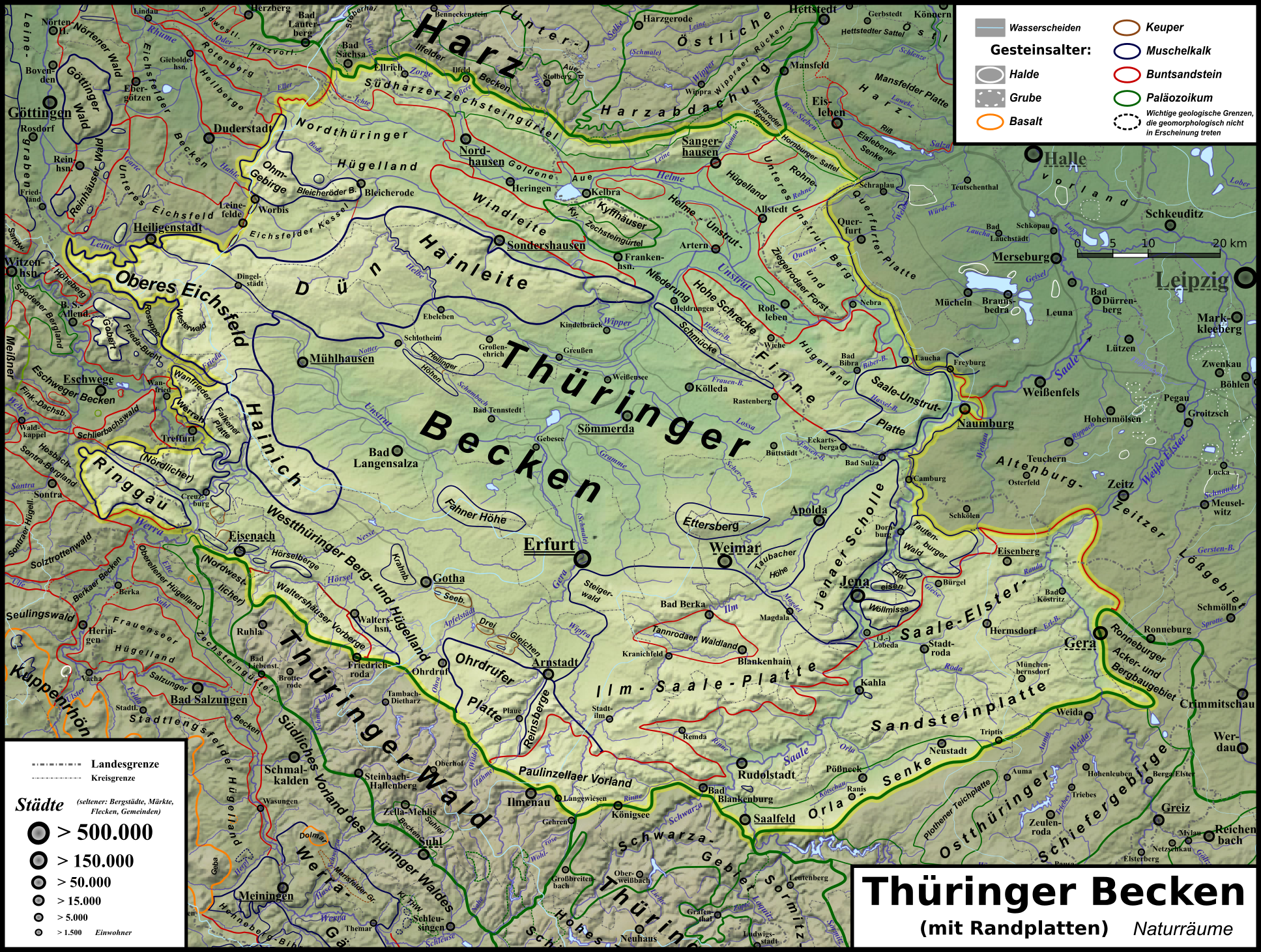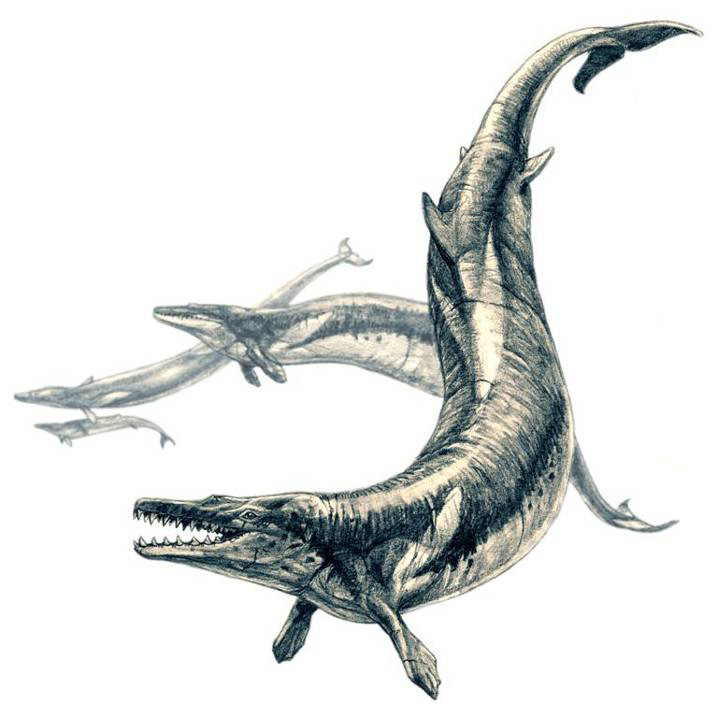|
Thuringian Basin
The Thuringian Basin (german: Thüringer Becken) is a depression in the central and northwest part of Thuringia in Germany which is crossed by several rivers, the longest of which is the Unstrut. It stretches about from north to south and around from east to west. Its height varies from about 150 to . The Basin is surrounded by a wide outer girdle of limestone (Muschelkalk) ridges (including Hainich, Dün, Hainleite, Hohe Schrecke, Schmücke, Finne), and to the southwest by the Thuringian Forest and to the southeast by sharply divided terraces (the Ilm-Saale and Ohrdruf Muschelkalk plateaus, and the Saale-Elster Bunter sandstone plateau). The Thuringian Basin belongs to the triassic period, during which horizontal beds of Bunter sandstone, Muschelkalk and Keuper were laid down. Below those lie the salt and gypsum layers of Magnesian Limestone (Zechstein). In the Cenozoic era the surrounding ridges were uplifted, whilst the Thuringian Basin sank to form a saucer-shaped depress ... [...More Info...] [...Related Items...] OR: [Wikipedia] [Google] [Baidu] |
Cenozoic
The Cenozoic ( ; ) is Earth's current geological era, representing the last 66million years of Earth's history. It is characterised by the dominance of mammals, birds and flowering plants, a cooling and drying climate, and the current configuration of continents. It is the latest of three geological eras since complex life evolved, preceded by the Mesozoic and Paleozoic. It started with the Cretaceous–Paleogene extinction event, when many species, including the non-avian dinosaurs, became extinct in an event attributed by most experts to the impact of a large asteroid or other celestial body, the Chicxulub impactor. The Cenozoic is also known as the Age of Mammals because the terrestrial animals that dominated both hemispheres were mammalsthe eutherians (placentals) in the northern hemisphere and the metatherians (marsupials, now mainly restricted to Australia) in the southern hemisphere. The extinction of many groups allowed mammals and birds to greatly diversify so tha ... [...More Info...] [...Related Items...] OR: [Wikipedia] [Google] [Baidu] |
Sömmerda
Sömmerda is a town near Erfurt in Thuringia, Germany, on the Unstrut river. It is the capital of the district of Sömmerda. History Archeological digs in the area that is now Sömmerda, formerly Leubingen, have uncovered prominently buried human remains dating to around 2000 BCE. One such burial of an individual, dubbed the "king of Leubingen" is the Leubingen tumulus. Sömmerda was first mentioned in official documents in 876 CE. It probably became a town in about 1350 but there are no existing records of the event. One town gate, dating from 1395, and six towers from the old town walls are still standing. During the Thirty Years' War (1618–1648) Sömmerda was at the heart of military activity, and soldiers from both sides ransacked the town, halving the population. In 1840, Johann Nikolaus von Dreyse invented the needle gun and a firearms factory was founded in the town. In 1919 the Rheinmetall company took over the factory, later called Rheinmetall-Borsig, at first ... [...More Info...] [...Related Items...] OR: [Wikipedia] [Google] [Baidu] |
Weißensee (Thüringen)
Weißensee (German: ''white lake'') may refer to: Places *Weissensee (Berlin), a district of Berlin *Weißensee, Thuringia, a town in Thuringia, Germany *Weissensee, Austria, a municipality in Carinthia, Austria *Weissensee (Carinthia), a lake in Carinthia, Austria * Weißensee (Füssen), a lake in Allgäu, Bavaria, Germany People * Friedrich Weissensee (c.1560–1622), German composer and Protestant minister Other *Weissensee, a song by Neu! from their eponymous first album *Weissensee, a song by Elder_(band) from their 2019 album The Gold & Silver Sessions *Weissensee (TV series) ''Weissensee'' is a German television series. The series is set in East Berlin between 1980 and 1990 and follows two families. Outline The plot follows the Kupfer family, who are well-connected within the communist regime. Hans Kupfer and his so ..., a German television series See also * White Lake (other) {{geodis ... [...More Info...] [...Related Items...] OR: [Wikipedia] [Google] [Baidu] |
Kindelbrück
Kindelbrück () is a municipality in the district of Sömmerda, in Thuringia, Germany Germany,, officially the Federal Republic of Germany, is a country in Central Europe. It is the second most populous country in Europe after Russia, and the most populous member state of the European Union. Germany is situated betwe .... It is situated on the river Wipper, 12 km north of Sömmerda. The former municipalities Bilzingsleben, Frömmstedt and Kannawurf were merged into Kindelbrück in January 2019. In January 2023 Kindelbrück absorbed the former municipality Riethgen. File:Rathaus Kindelbrück.JPG, Town hall Kindelbrück File:Stadtkirche Kindelbrück.JPG, Church Kindelbrück Inhabitants References Sömmerda (district) {{Sömmerda-geo-stub ... [...More Info...] [...Related Items...] OR: [Wikipedia] [Google] [Baidu] |
Clingen
Clingen is a town in the Kyffhäuserkreis district, in Thuringia, Germany. It is situated 16 km southeast of Sondershausen, and 30 km north of Erfurt Erfurt () is the capital and largest city in the Central German state of Thuringia. It is located in the wide valley of the Gera river (progression: ), in the southern part of the Thuringian Basin, north of the Thuringian Forest. It sits i .... ''as of 31 December'' Source: Thuringian State Department of Statistics Sons and daughters of the town * Rudolf Boese (1839-1912), Member of Landtag * Günter Grüner (1942-2016), Member of Thuringian State Parliament References Towns in Thuringia Kyffhäuserkreis Schwarzburg-Sondershausen {{Kyffhäuserkreis-geo-stub ... [...More Info...] [...Related Items...] OR: [Wikipedia] [Google] [Baidu] |
Greußen
Greußen is a town in the Kyffhäuserkreis district, in Thuringia, Germany. It is situated 17 km southeast of Sondershausen, and 29 km north of Erfurt Erfurt () is the capital and largest city in the Central German state of Thuringia. It is located in the wide valley of the Gera river (progression: ), in the southern part of the Thuringian Basin, north of the Thuringian Forest. It sits i .... In January 2021 it absorbed the former municipalities Großenehrich and Wolferschwenda. References Kyffhäuserkreis Schwarzburg-Sondershausen {{Kyffhäuserkreis-geo-stub ... [...More Info...] [...Related Items...] OR: [Wikipedia] [Google] [Baidu] |
Großenehrich
Großenehrich is a town and a former municipality in the Kyffhäuserkreis district, in Thuringia, Germany. It is situated 13 km south of Sondershausen, and 34 km northwest of Erfurt. Since January 2021 it is part of the town Greußen Greußen is a town in the Kyffhäuserkreis district, in Thuringia, Germany. It is situated 17 km southeast of Sondershausen, and 29 km north of Erfurt Erfurt () is the capital and largest city in the Central German state of Thur .... References Kyffhäuserkreis Former municipalities in Thuringia {{Kyffhäuserkreis-geo-stub ... [...More Info...] [...Related Items...] OR: [Wikipedia] [Google] [Baidu] |
Ebeleben
Ebeleben is a town in the Kyffhäuserkreis district, in Thuringia, Germany Germany,, officially the Federal Republic of Germany, is a country in Central Europe. It is the second most populous country in Europe after Russia, and the most populous member state of the European Union. Germany is situated betwe .... It is situated 13 km southwest of Sondershausen. The former municipality Thüringenhausen was merged into Ebeleben in December 2019. References Kyffhäuserkreis Schwarzburg-Sondershausen {{Kyffhäuserkreis-geo-stub ... [...More Info...] [...Related Items...] OR: [Wikipedia] [Google] [Baidu] |
Schlotheim
Schlotheim is a town and a former municipality in the Unstrut-Hainich-Kreis district, in Thuringia, Germany. It is situated east of Mühlhausen. Since December 2019, it is part of the town Nottertal-Heilinger Höhen. Notable residents * Werner Braune (1909–1951), German Nazi SS officer, executed for war crimes *Carlos Hartling Carlos Hartling (2 September 1869 – 13 August 1920) was a German-born composer from Honduras, who composed the music for the national anthem of Honduras, adopted as the country's national anthem in 1915. Born in Schlotheim, Schwarzburg-Rud ... (born in 1869) German musician author of the music of the National Anthem of Honduras. References Unstrut-Hainich-Kreis Schwarzburg-Rudolstadt Former municipalities in Thuringia {{UnstrutHainich-geo-stub ... [...More Info...] [...Related Items...] OR: [Wikipedia] [Google] [Baidu] |
Free Imperial City
In the Holy Roman Empire, the collective term free and imperial cities (german: Freie und Reichsstädte), briefly worded free imperial city (', la, urbs imperialis libera), was used from the fifteenth century to denote a self-ruling city that had a certain amount of autonomy and was represented in the Imperial Diet. An imperial city held the status of Imperial immediacy, and as such, was subordinate only to the Holy Roman Emperor, as opposed to a territorial city or town (') which was subordinate to a territorial princebe it an ecclesiastical lord ( prince-bishop, prince-abbot) or a secular prince ( duke ('), margrave, count ('), etc.). Origin The evolution of some German cities into self-ruling constitutional entities of the Empire was slower than that of the secular and ecclesiastical princes. In the course of the 13th and 14th centuries, some cities were promoted by the emperor to the status of Imperial Cities ('; '), essentially for fiscal reasons. Those cities, which ... [...More Info...] [...Related Items...] OR: [Wikipedia] [Google] [Baidu] |



